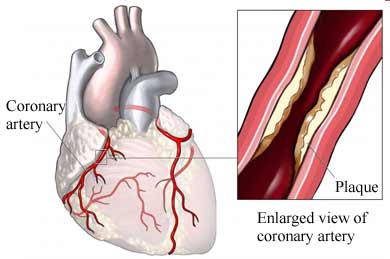“What About Coronary Artery Blockages After Heart Valve Surgery?” Asks Mike
By Adam Pick on June 12, 2013
Mike just sent me an interesting question about angina and coronary artery disease after valve surgery. In his note, Mike writes, “Hi Adam – I had an aortic valve replacement and double bypass in June 2004 by Dr. Joe Bavaria, Hospital University of Pennsylvania. Subsequently, I have been diagnosed with angina. I have also had several cardiac catheterizations and stents placed in the artery since my surgery. I understand that 10% of all stent and cardiac cath patients have recurrence of artery blockage. Do you know if anyone is doing research on this issue?

To provide Mike an expert response, I contacted his surgeon, Dr. Joseph Bavaria at Penn Medicine. Within hours of sending Dr. Bavaria this question, I received the following response:
The answer is a bit Nuanced and a little complicated.
Key Point #1. First of all, coronary artery disease is a progressive disease that affects all the arteries in the heart. Sometimes, over time, there are additional arteries in the heart that become blocked and it is common for these to receive a stent if they are causing angina.

Key Point #2. Sometimes, the bypass grafts, after years, will begin to fail. This is especially true of Vein grafts – much less true of Arterial grafts especially if the surgeon used a Left Internal Mammery Artery (LIMA). These LIMA grafts tend to stay open a long time. The Vein grafts can degenerate for multiple reasons late (years) after surgery. We would like to use Arterial grafts as much as possible but we do reserve them for the more “important” arteries in the heart as you are always “stealing” some blood flow to another vascular bed when taking an artery as a bypass graft (similar to borrowing from Peter to pay Paul — so to speak). An example would be using the Radial artery from the forearm to bypass the blockages in the heart. The hand then only has one artery supplying it. This is usually well tolerated but surgeons make the decision (pros vs cons) the best they can at the time of initial surgery.
Key Point #3. The issue of recurrent Coronary artery blockage is important. As I said earlier in Point #1, Coronary disease is progressive but can be “slowed down” with statins, Aspirin/Plavix, Blood pressure control, proper diet, and other drugs and lifestyle choices. Additionally, what we call “In-Stent” stenosis, or blockage of the stents later (just like blockage of the Vein grafts late after bypass) occurs in a certain percentage of patients. There has been a lot of research into this topic — especially regarding the use of anti-platelet drugs.
Key Point #4. Unfortunately, with Coronary artery disease Surgery or catheter procedures “treat” but do not “cure” the disease. Best practice is good prevention if possible.
I hope this helped Mike (and perhaps you) learn more about coronary artery disease after heart valve surgery. I know it helped me. Many, many, many thanks to Dr. Joe Bavaria for sharing his research and clinical experiences with our patient community.
Keep on tickin!
Adam
|
mike says on June 12th, 2013 at 7:27 pm |
|
My father in law is 82 and just had tavr last week and was doing great however he is now experiencing mild chest pain and arm tingling and his blood pressure is elevated should this be something to worry about or is this somewhat normal |
 |












